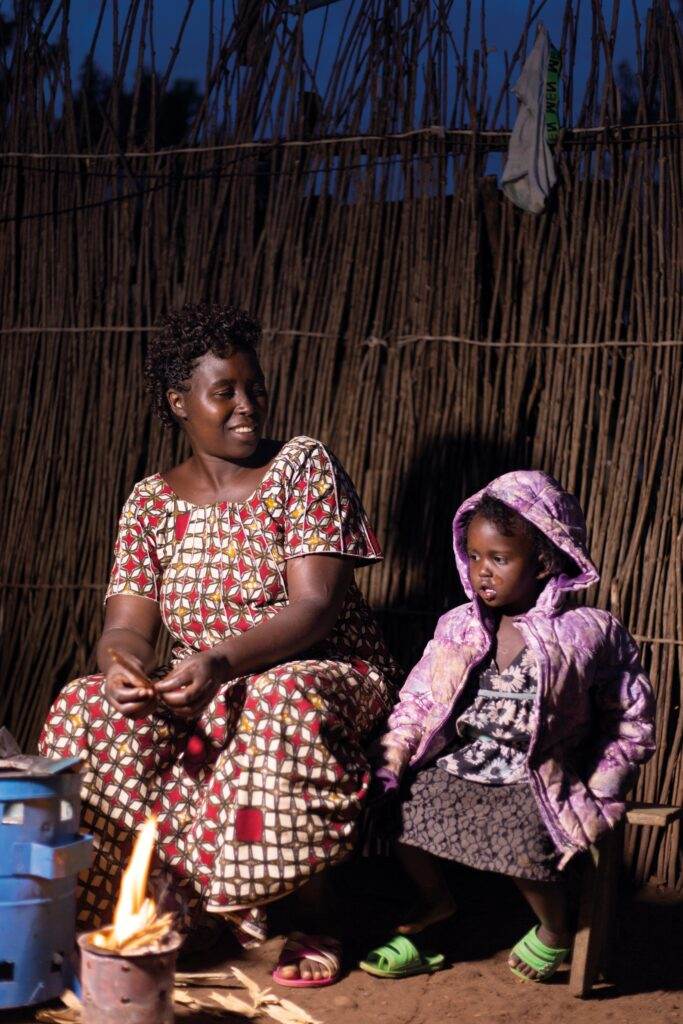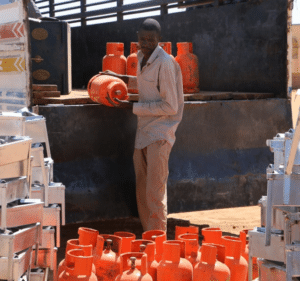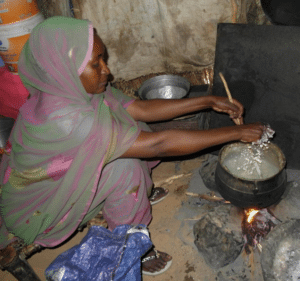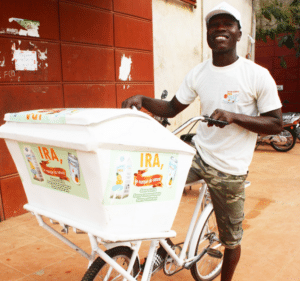What is clean cooking?
Clean cooking is a critical issue for the world’s poorest communities. Over 2.5 billion people rely on unsafe fuels like kerosene or biomass (wood, charcoal, and animal dung) for cooking. These fuels are both inefficient and harmful, particularly when used indoors without proper ventilation.
How does unclean cooking impact people?
Open fires and burning kerosene indoors create dangerous air pollution. Inhaling the resulting smoke and fumes causes an increased risk of lung cancer, pneumonia, heart disorders and strokes for household members. It’s estimated that 3.2 million people die prematurely every year because of household air pollution.
Gender norms and expectations around domestic responsibilities mean that cooking falls mainly to women and girls. Unfortunately, this means they have less time available to study, carry out paid work and simply relax. They spend more time in the home in general. Cooking and being indoors mean they are particularly exposed to air pollution.
How does unclean cooking impact the planet?
Cooking with inefficient, biomass-fuelled stoves emits greenhouse gases, which contribute to global warming. Biomass can also be harmful to the environment and local biodiversity if the fuel used is wood-based and gathered through cutting down trees.
Wood and charcoal-fuelled stoves emit black carbon (commonly known as soot). This is a key contributor to climate change and sea level rise. Black carbon stays in the atmosphere for a shorter time than the more well-known greenhouse gas, carbon dioxide (CO2), but it returns to earth during rain or snowfall. This black soot darkens the surface of sea ice and glaciers, increasing their surface temperature and accelerating melting. Melting glaciers lead to rises in sea levels, increased risks of flooding and longer-term risks to freshwater access in many parts of the world.
When wood is cut down and burned it also emits CO2. Trees and shrubs tend to be cut down at a much faster rate than their regrowth, leaving forests destroyed. Trees and other plants are vital for absorbing and storing CO2 from the atmosphere, so deforestation accelerates climate change. Deforestation also leads to biodiversity loss, as well as soil erosion which increases the risk of floods.

Our Renewable Energy for Refugees Projects aim to improve the health, wellbeing & security in Rwandan refugee camps & host communities through access to sustainable, clean cooking stoves.
What clean cooking solutions exist?
There are a range of cleaner cooking solutions available for people living in low-income countries with limited resources. At Practical Action, we believe that all households should have access to the cleanest, most efficient and sustainable solutions possible for their context.
What is clean cooking energy?
Here are some great options:
- Renewable-based electric e-cooking is the most climate-friendly option as it does not release harmful emissions. It’s also better for human health.
- Liquified Petroleum Gas (LPG) is a fossil fuel and emits carbon dioxide, but these stoves are a lot less polluting than both biomass and kerosene stoves, making them a better option for both people and the planet.
- Biogas and bioethanol are both clean-burning options. Since they are produced from agricultural waste, they are especially practical and viable in rural areas or where organic feedstock is available.
- Fuel-efficient and advanced biomass stoves can reduce emissions and deforestation because they need less fuel. While their health benefits are limited, they are often the most economically viable cleaner option.
Practical Action’s ambitions for clean cooking
Practical Action aims to provide access to clean cooking solutions for 10 million people by 2030. We will do this by:
- Working directly with communities to ensure stoves are appropriate and sustainable for their local contexts.
- Using a systems approach to influence change on a wider scale.
Our approach involves strengthening supply and stimulating demand, working together with a diverse range of public and private sector partners, as well as other charities and research organisations who share our ambitions. All our work is underpinned by a commitment to gender transformative change. This means we want to change not only the fuel people use to cook, but also the underlying beliefs that result in women and girls spending a disproportionate amount of time putting food on the table.
Clean cooking powered by women
Clean cooking has the potential to transform the lives of women; in the home, the distribution of domestic duties continues to be weighted towards women and girls, world-wide. Cooking duties falling mainly to women means that a disproportionate number of women and girls are affected by unsafe stove emissions; indeed, air pollution is one of the leading causes of mortality among women globally. Not only can cooking be a cleaner, safer activity that takes up less of their daily lives; but when food preparation is not harmful to health, it can also become an attractive career for female entrepreneurs.
In Kenya, Practical Action has contributed to transforming the cooking sector so that women can take part in the development, supply chain and sales of cookstoves and fuels. Thanks to this work, over 400 entrepreneurs (mostly women) gained support to grow their businesses through training, mentorship and improved access to markets and finance. The entrepreneurs have enjoyed great results: most have told us their sales are increasing, along with their confidence, and the power they hold within their households to make decisions or manage money.
We’ve also contributed to change on a wider scale through our partnerships, our research and our advocacy work. The Kenyan Government has now adopted a National Gender Policy for Energy, a framework which we’re assisting them to implement across the country.
Clean cooking in humanitarian settings
In 2021, almost 90 million people were displaced from their homes because of conflicts and disasters. Many of these people end up living in camps and relying on humanitarian assistance. The food provided by humanitarian agencies is usually raw and requires cooking, but cook stoves and fuel are rarely provided. So these displaced families are left with no option but to use inefficient biomass stoves which pollute their homes and cause ill-health. It also takes hours to forage for such fuels, and sourcing them contributes to deforestation.
Since 2017, we’ve been working with refugees residing in Rwandan camps. Our projects have helped these communities to access both electricity, and cleaner cooking stoves and fuels.

In Darfur, shared knowledge and improved technology is making cooking at home safer and cheaper.
In 2021, we worked with two local suppliers of clean-cooking stoves suppliers. They began to sell improved cookstoves and sustainable biomass pellets to residents of the Kigeme and Nyabiheke refugee camps, as well as communities living around the camps. Almost 7,000 stoves were purchased, all of which are now contributing to lowering air pollutions levels and reducing deforestation rates. 81% of the stove users reported feeling safer since buying a cleaner cookstove. Households are spending 23% less on fuel on average per month and they also save time that would have been spent collecting firewood and other fuels. The money saved can be spent on other basic needs, their children’s education, or invested in a business. So it’s a win-win for families, health and the environment!

